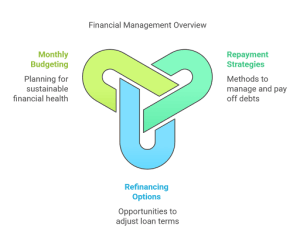Paying back your private student loans is like sailing in uncharted waters. You graduate from college and find your first job awaiting you. And then, as if this were not enough trouble, buzzkill strikes again as you grapple with a mountain of private student loans you have accumulated. You would rather ask—and I am sure you would—if there is any way to have the repayments on that loan match your income, like the income-based repayment for federal loans.
The realization comes as quite a shock to many borrowers that private student loans offer little flexibility compared to federal loans. A thorough insight into your repayment options could make a world of difference. In this blog, let us discover whether IBR applies to private student loans, discover alternative repayment options, and lend some aid with strategies to effectively manage your student loan debt.
International students looking for international student loans without a cosigner may find options sparse, but it is not impossible. Specific lenders provide loans specifically for international students without requiring a U.S.-based cosigner. There are also emergency student loans for all situations when immediate funds are needed.
Another question worth considering: Do private loans go directly to the school? To anyone who has barely even glanced into the subject: Yes, for the most part. Private lenders will give the loan funds to your school as a provider of your education, knowing that the funds will be used for tuition and other charges—the balance will be released to the student.
Understanding the Landscape: IBR and Private Student Loans
The Reality of Private Loans
Private loans do not offer the flexibility and protections of federal loans, such as income-based repayment plans. Instead, they are more like traditional bank loans with fixed terms and repayment schedules.
| Feature | Federal Loans | Private Loans |
| Income-Based Repayment (IBR) | Available | Rarely Available |
| Forgiveness Programs | Available (e.g., PSLF) | Not Available |
| Deferment/Forbearance Options | Standardized | Varies by lender |
| Interest Rates | Fixed, subsidized, or low | Variable or fixed, often higher |
The Scarcity of IBR for Private Loans
So-called income-based repayment private student loans tend to be the purview of federal loans; it is rare for private lenders to offer such plans at all. Most private loans focus on fixed payment schedules rather than flexible options tied to a borrower’s income.
Decoding Private Loan Repayment Options
Why Are IBR Plans Rare for Private Loans?
Private lenders lack the public policy incentives that drive federal loan programs to support borrowers. Instead, they focus on profitability and risk management.
Federal IBR Comparison Plans
Let’s conduct a comparative study to better elucidate the gap between federal repayment schemes and private repayment schemes.
Alternative Repayment Options for Private Loans
Deferment and Forbearance
These allow one to stop or reduce their payments temporarily, essentially during the income hardship period, with interest continuing to accrue. Thus, the total amounts owed will differ in these cases.
| Feature | Deferment | Forbearance |
| Purpose | Unemployment, returning to school | Temporary financial hardship |
| Interest | May not accrue on subsidized loans | Interest accrues on all loans |
| Duration | Typically longer, up to 3 years | Shorter, up to 12 months |
Refinancing
If you qualify, refinancing is getting a new loan to pay off an existing debt, generally at a lower interest rate. Most often, you must have good credit and a good income level. This is often seen as the best way to consolidate student loans.
Pros of Refinancing:
- Reduced interest rate.
- Easier to manage one loan instead of several.
Cons of Refinancing:
- Loss of borrower protections.
- You need a good credit score and a decent income level to qualify.
- Lower interest rates.
- Simplified repayment by consolidating multiple loans.
Cons of Refinancing:
- May lose borrower protections.
- Requires strong credit and income.
Investigating Lender Policies
Lender Flexibility
Some private lenders offer limited hardship programs, little in the way of temporary payment pauses or customized repayment options. Consider customers who already contribute to the success of a specific lender, such as SoFi and Earnest.
Investigating Lender Policies
This is how you can efficiently compare lenders:
| Research Tip | Action |
| Check customer reviews | Use forums and review platforms to assess lender flexibility. |
| Speak to a representative | Contact lenders directly to ask about repayment options. |
| Scrutinize loan terms | Look for clauses about deferment, forbearance, or alternative payment plans. |
Negotiation Strategies with Private Lenders
When and How to Negotiate
Private lenders will modify repayment terms if you present a strong case. The timing is right to negotiate when facing financial hardship or when your income has been affected
Tips for Negotiating
- Prepare documents such as income statements, monthly budgets, and hardship letters.
- Understand Your Loan Terms: Be clear on interest, penalties, and repayment schedules.
- Be Specific: Clearly state your desired changes (e.g., temporary payment reduction).
- Research CPP Experience: Learn from others who negotiated successfully.
 The Impact on Credit Score
The Impact on Credit Score
Positive and Negative Effects
Your repayment choices will directly impact your credit score. Here’s how:
| Action | Impact on Credit |
| Making on-time payments | Improves credit score by building a positive payment history. |
| Missing payments | Significantly damages your credit score and incurs penalties. |
| Entering deferment/forbearance | Neutral, as payments are paused but interest accrues. |
Tips to Protect Your Credit
- Don’t miss a payment—even if it’s just a minimal one.
- Schedule autopay.
- Practice ongoing review of your credit report.
The Role of Financial Counseling
Benefits of Financial Counseling
Financial counselors help you:
- Understand repayment strategies.
- Explore options for Refinancing.
- Create a sustainable budget.
 Finding Advisors
Finding Advisors
Look for student loan specialists through organizations like the National Foundation for Credit Counseling (NFCC) or Student Loan Planner.
Long-Term Financial Planning
- Budgeting Strategies: Soon rather than later, allocate percentages of your earnings to loan payments while saving for other essential monthly needs.
- Integrating Student Loan Repayment: Repayment should be integrated within broader financial goals, including emergency savings, retirement, or home purchase.
Real-Life Insights
Case Studies:
- Sarah refinanced her private loan of $50,000 from 8% to 4%, saving up to $10,000 in any deferred interest during the loan’s lifetime.
- Mark delayed repayment due to job loss, avoiding default while he built up his financial life again.
Conclusion
Paying off private student loans may feel like a daunting task, but it’s far from impossible. While income-based repayment might not be on the table for most private loans, there are actionable alternatives—deferment, forbearance, negotiation, and refinancing—that can help ease the burden.
Ready to regain control of your financial future?
Start by understanding your loan’s terms and your lender’s regulations. Explore every repayment option available, and don’t hesitate to seek professional guidance from financial counselors or legal experts.
👉 Take charge today—visit Wealthopedia to discover comprehensive tools, expert-backed resources, and real-world strategies designed to help you tackle your student loan debt confidently.
You’re not alone on this journey. With the right plan and support, financial freedom is within reach.



